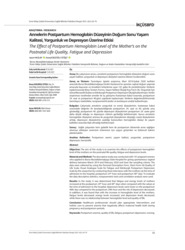Annelerin Postpartum Hemoglobin Düzeyinin Doğum Sonu Yaşam Kalitesi, Yorgunluk ve Depresyon Üzerine Etkisi
-
Eser Sahibi
NURAY EGELİOĞLU CETİŞLİ
-
Tür
Makale
- Yayın Tarihi 2021
-
Yayıncı
İzmir Kâtip Çelebi Üniversitesi Sağlık Bilimleri Fakültesi
- Dergi Adı İzmir Katip Çelebi Üniversitesi Sağlık Bilimleri Fakültesi Dergisi 2, ( 6 ), pp.63 - 70
- Tek Biçim Adres https://hdl.handle.net/11469/2106
-
Konu Başlıkları
Postpartum anemi
Yaşam kalitesi
Yorgunluk
Postpartum depresyon
Hemşirelik
Postpartum anemia
Fatigue
Postpartum depression
Nursing
Quality of life
Amaç: Bu çalışmanın amacı, annelerin postpartum hemoglobin düzeyinin doğum sonu yaşam kalitesi, yorgunluk ve depresyon düzeyleri üzerine etkisini incelemektir.
Gereç ve Yöntem: Tanımlayıcı tipteki araştırma, Mart 2019-Şubat 2020 tarihleri arasında Bursa Mustafakemalpaşa Devlet Hastanesi’ne spontan vajinal doğum yapmak amacıyla başvuran ve örneklem kriterlerine uyan 141 gebe ile yürütülmüştür. Verilerin toplanmasında Birey Tanıtım Formu, Yaşam Kalitesi Ölçeği Kısa Form-36, Yorgunluk İçin Görsel Benzerlik Skalası ve Edinburgh Postpartum Depresyon Ölçeği kullanılmıştır. Veriler araştırmacı tarafından anneler ile üç görüşme (hastaneye kabul sırasında, postpartum 24. saat ve postpartum 40.gün) yapılarak toplanmıştır. Verilerin değerlendirilmesinde tanımlayıcı istatistikler, nonparametrik testler ve korelasyon analizi kullanılmıştır.
Bulgular: Çalışmada annelerin yorgunluk ve enerji düzeylerinin, hastaneye kabul sırasındaki değerler ile karşılaştırıldığında postpartum 24. saat ve 40. günde artış gösterdiği, postpartum 40. günde depresyon düzeylerinin postpartum 24. saate göre daha düşük olduğu ve depresyon riskinin gerilediği belirlenmiştir. Ayrıca annelerin hemoglobin düzeyinin artması ile yorgunluk düzeylerinin düştüğü, enerji düzeylerinin arttığı, depresyon düzeylerinin azaldığı bulunurken hemoglobin düzeyi ile yaşam kaliteleri arasında ilişki olmadığı belirlenmiştir
Sonuç: Sağlık çalışanları hem gebelik hem de postpartum dönemde anne sağlığını olumsuz etkileyen aneminin önlenmesi için uygun girişimleri ve bütüncül bakımı planlamalıdır.
Objective: The aim of this study is to examine the effects of postpartum hemoglobin level of the mothers on the postnatal life quality, fatigue and depression levels. Material and Method: The descriptive study was conducted with 141 pregnant women who applied to Bursa Mustafakemalpaşa State Hospital for giving spontaneous vaginal delivery between March 2019 and February 2020 and have the sampling criteria. The data were collected by using the Personel Description Form, Short Form-36 Quality of Life Scale, Visual Analogue Scale for Fatigue and Edinburgh Postpartum Depression Scale by the researcher by conducting three interviews with the mothers (at the time of admission to the hospital, postpartum 24th hour and postpartum 40th day). To evaluate the data descriptive statistics, nonparametric tests and correlation analysis were used. Results: In the study, it was determined that fatigue and energy levels of mothers increased at the postpartum 24th hour and 40th days when compared with the values at the time of admission to the hospital, depression levels were lower on the postpartum 40th day compared to the postpartum 24th hour and the risk of depression decreased. In addition, it was found that with the increase in hemoglobin level of the mothers, fatigue levels decreased, energy levels increased, and depression levels decreased, while there was no relationship between hemoglobin level and quality of life. Conclusion: Healthcare professionals should plan appropriate interventions and holistic care to prevent anemia that negatively affects maternal health both during pregnancy and postpartum periods.
-
Koleksiyonlar
FAKÜLTELER
SAĞLIK BİLİMLERİ FAKÜLTESİ

 Tam Metin
Tam Metin

